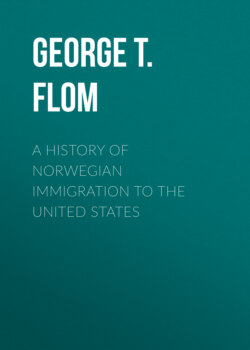Читать книгу A History of Norwegian Immigration to the United States - George T. Flom - Страница 4
На сайте Литреса книга снята с продажи.
INTRODUCTION
ОглавлениеTable of Contents
In this volume I shall aim to give an account of the Norwegian immigration movement from 1825 down to 1848. Thereupon will follow a brief survey of the course of the movement and the growth of the settlements founded here in that period. In the introductory pages I shall discuss briefly individual immigration from Norway from its earliest known beginnings down to 1825.
Immigration from Norway resulted in the founding of settlements in New York, Illinois, Wisconsin and Iowa successively; I shall try to give a correct narrative of the beginnings and the growth of these settlements. In this part of the work I shall stress the oldest and largest settlements in Southern Wisconsin and Northern Illinois, for the relation of these to the whole movement and later colonization of the Northwestern States by the Norwegians is one of especial importance. I shall treat somewhat fully of the causes of emigration, of the growth of the movement, and the part in it that each district or province in Norway has played. The leaders from each district and the founders of the settlements here will be named and in many cases, sketches will be given of their lives. Such questions as the course of the movement in Norway, the cost of the voyage, the course of the journey, early wage conditions, the economic conditions of the immigrants, the geographical trend of settlement, will also be considered, and approximately complete lists of the accessions in each settlement for the first few years will be given. The limits of this volume, however, will preclude the treatment of social or cultural questions, or to take more than the briefest notice of the pursuits and occupations of the Norwegian-American and his contribution to American life. I hope to be able to treat elsewhere, later, of some of these problems.
The story of the immigrant settler is one that is well worth the telling; it is one that is justly receiving increased attention in recent years. I believe that the writer of American history will, in the future, pay far greater attention than he has in the past to the immigrant pioneer as a factor in the development of the nation. There are in America today about one million people of Norwegian birth, or Norwegian parentage. That is, there are nearly half as many of that nationality in America as in Norway itself. The transplanting of so large a proportion of a race from the land to which it is rooted by birth and by its history is indeed remarkable.
Various European peoples have contributed to the growth of the American population; they have each given something to the sum total of present American life and in some measure helped to shape American institutions. As a people America is yet in the formative period; racially, at least, one-half of the population is not Anglo-Saxon. It is by the amalgamation of all its ethnic factors that the future American people will be evolved. The contribution that each foreign element will make to that evolution will be determined by the civilization, which each represents as its racial heritage, the culture which, in the course of its history, each has evolved as a people and a nation. As the true student of American history takes note of these things in the future, the significance of the foreign factor in the growth and the upbuilding of the country will receive its just recognition.
We of Norse blood, but American birth, if we are true to the best that is in us, cannot fail to have an interest in the trials and the achievements of the pioneer fathers. We must recognize the true heroism of the men and women who braved the hardships and suffered the privations of frontier life in the thirties, the forties and the fifties. The part that the pioneers of those days played in the development of the Northwest was a great one; in comparison with it that of the present generation is wholly insignificant. It is to the memory of those pioneers, in recognition of their true worth, that this record of their coming is dedicated.
